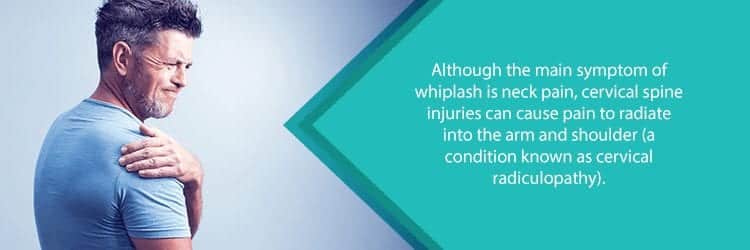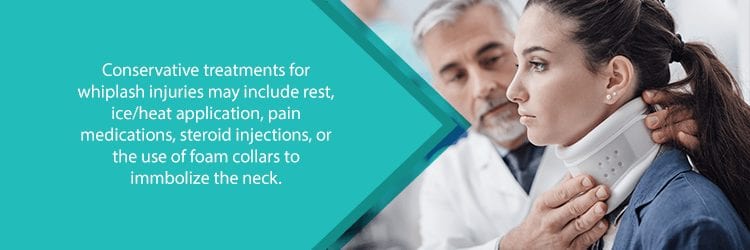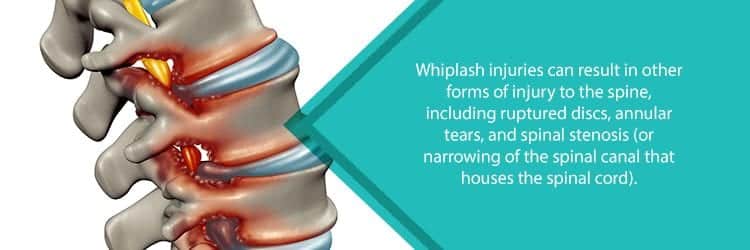Have you recently been involved in a car accident where you were rear-ended or sideswiped? Are you suffering from resultant neck pain and want to find relief asap?
Whiplash is the non-medical or colloquial term for this form of injury. In doctor speak, whiplash injuries are sometimes referred to as acceleration-deacceleration injuries or cervical hyperflexion-hyperextension injuries. The sudden jolting of the head (back and forward or side-to-side) puts extreme stress on the cervical spine, resulting in neck strain.
What is Whiplash?
Your neck has the difficult job of supporting your head. After all, a typical head weighs about the same as a typical bowling ball. Whiplash is an injury to the cervical spine and/or surrounding soft tissues of the neck as the result of an intense impact. During the impact, your head violently shifts forward and then back. This quick shift in directions can strain soft tissues like muscles and ligaments. In more extreme cases, the injury may even damage the discs that sit between each vertebra.
Car accidents are usually the main cause of whiplash injuries. However, they can also occur because of other things, such as playing contact sports, riding roller coasters, or suffering physical abuse.

Whiplash During a Rear-End Collision
Since whiplash is most common during a car accident, let’s take a look at how your neck behaves during a rear-end collision.
When your car gets hit from behind, the force of the collision pushes the seat up against your spine. This impact drives your neck upward. As your torso continues to move forward against the seat, your head remains in place. This initial jolt may affect bony structures such as your facet joints or soft tissues like intervertebral discs. Then, very quickly, your head slams back against the seat, stressing the soft tissues (like muscles) at the front of your neck. As your head bounces against the headrest, it jolts forward while your seatbelt keeps the rest of your body in place. This may injure the soft tissues at the back of your neck or even surrounding your thoracic spine.
All of this happens in an instant. Unfortunately, there is little that you can do to protect yourself from these types of car accidents. Even if you drive carefully yourself, you can’t control other distracted drivers on the road.
Common Whiplash Symptoms
Immediately after a car accident, you may or may not feel any pain. After all, your nervous system’s fight-or-flight response is engaged, causing a surge of adrenaline and stress hormones which may limit your sensations of pain. In addition, after a bad car accident, your body may go into shock, which also affects your ability to detect pain. In fact, symptoms may not begin until a couple of days after the accident
Be on the lookout for these 5 common symptoms of whiplash:
- Neck Pain: This type of pain varies depending on your specific injury. Pain can range from a nuisance to a severe interference with your daily functioning. Some people experience neck pain only in one specific spot; whereas others may feel pain coursing down their shoulder or arm. While most neck discomfort is caused by strains (or tears) to surrounding muscles and soft tissues, sometimes a herniated disc or annular tear can be to blame.
- Reduced Range of Motion in the Neck: Since the structures of your neck are damaged, you may experience neck stiffness or pain while turning your head in certain directions. This can limit the movements that you are comfortable performing with your neck.
- Headaches. Damage to the neck muscles or nerves may cause ongoing headaches that originate at the base of the skull.
- Pain Throughout the Upper Body: A compressed nerve because of joint or disc damage can cause pain to radiate to other areas of the body including the shoulders, arms, and hands. Known as cervical radiculopathy, this type of pain usually affects one side of the body. In addition, muscle or ligament damage can affect the shoulders or upper back, leading to pain and muscle spasms.
- Other Symptoms: Depending on your injury, you may also experience fatigue, dizziness, blurred vision, or ringing in the ears (tinnitus). You may also experience mental health issues like irritability, difficulty sleeping, reduced concentration, or even, depression.

Diagnosing Whiplash Injuries
If you feel neck pain after a car accident, sports injury, or assault, then you should receive a physical exam from your doctor. Whiplash pain often occurs for different reasons. Some symptoms may clear up on their own after a couple weeks or months. Other times, the injury is more serious and needs prompt medical attention. Regardless, requesting an immediate exam from your doctor allows you to learn the source of your neck pain. In addition, you will also have medical documentation of your injury if further legal action is required.
During a physical examination, your doctor will review your medical history and perform a series of tests to determine the cause of your neck pain. This includes assessing your posture, palpating (or feeling) certain areas of the neck, and measuring your range of motion. Furthermore, your doctor may perform a nerve conduction study if he or she suspects that you have suffered nerve damage as the result of your whiplash injury.
Likewise, if your doctor suspects a fracture or injury to a nerve, then your exam may also include testing your reflexes and looking for any muscle weakness in your hands, arms, or shoulder. Diagnostic imaging like an X-ray, CT, scan, or MRI, may be used to obtain a better look at the bones and soft tissues affected by your injury.
Treating Your Whiplash Injury
Several treatment options are available to help reduce pain and tend to areas damaged by whiplash. In many cases, doctors prescribe conservative treatments like rest, pain medications, and whiplash exercises. Those with more serious complications, like a herniated disc, may require minimally invasive spine surgery.
The ultimate goal of whiplash treatment should be getting you back to your normal activities. This includes pain management and restoring range of motion to your neck.
Here are some ways that conservative treatments may help:
- Rest: Damaged tissues need rest so that the body’s innate healing processes can restore functioning. Minor whiplash injuries can greatly benefit from a period of resting the affected area. Too much rest, however, can make your recovery take longer. Make sure that you check in with your doctor after resting for a couple days to reevaluate your symptoms.
- Ice or Heat Application: Using ice or heat can help to reduce inflammation to soft tissues and decrease overall pain. Your doctor will recommend an ice/heat regimen to reduce swelling to soft tissues and numb the pain.
- Pain Medications: Both over-the-counter and prescription medications may reduce pain and inflammation. In addition, muscle relaxants can relieve the tightness associated with strained muscles. However, prescription pain medications should be used only as directed because they can be habit-forming.
- Injections: If oral medications aren’t soothing your neck pain, then injections can target a more specific area. Steroid or lidocaine injection may prove more effective than using pills.
- Foam Collars: In some cases, using a foam collar or neck brace can allow the neck to heal more quickly by immobilizing it (or forcing rest). Check with your doctor for proper instructions about when and how long to use them.

Physical & Holistic Therapies for Whiplash
In addition to your doctor’s care, other medical disciplines may prove helpful in treating whiplash. For example, physical therapy sessions including whiplash exercises can help to restore the neck’s normal range of motion. A physical therapist can also perform manual manipulations and suggest exercises to improve posture and strengthen weak neck muscles.
Some people find chiropractic care for neck to be particularly useful. Chiropractors perform joint manipulation techniques to realign your cervical spine and reduce pressure on nearby soft tissues. Massage therapy can also prove beneficial for soothing muscle spasms and neck strain. Enlisting the assistance of a qualified massage therapist, in addition to other treatments, can reduce the time you suffer from whiplash symptoms.
A car accident or other traumatic injury may also cause psychological distress. Post-traumatic stress disorder often occurs after an event that significantly threatens one’s everyday sense of safety and well-being. Even months after an accident, one can feel anxiety and emotional stress related to the event. Stress increases muscle tension, which makes it harder for the neck to relax and heal. A psychotherapist can help you work through anxiety and depression related to an accident. In the long run, this will make you feel better both mentally and physically.
Minimally Invasive Whiplash Surgery
In some cases, severe damage to the neck and cervical spine may require the assistance of an orthopedic surgeon. If a car accident or other major trauma led to a ruptured disc or spinal stenosis (narrowing of the spinal canal), surgery may be your best option. Luckily, there are numerous minimally invasive options available. By recruiting the latest technology, these procedures use small incisions and specialized medical equipment to reduce damage to nearby soft tissues. As a result, you can expect less pain after surgery and quicker recovery times.

Getting Help for Your Whiplash Pain
Were you the victim of a rear-end collision or other physical trauma? Has your neck pain prevented you from working or doing the things you love? NJ Spine & Orthopedic is ready to help. Our back doctors take the time to listen to your symptoms, review your medical history, and discuss the most effective treatments for your particular whiplash injury. In many cases, we can find conservative ways to help you manage your pain and get on with your life.
If surgery is your best option, then our doctors have decades of experience in treating a variety of orthopedic issues. We will help you get your life back quicker and with less unsightly scarring.
Calling (855) 586-2615 today is the first step to finally getting the help you need for a whiplash injury. Don’t delay. Your time is precious, why not enjoy it pain-free?

